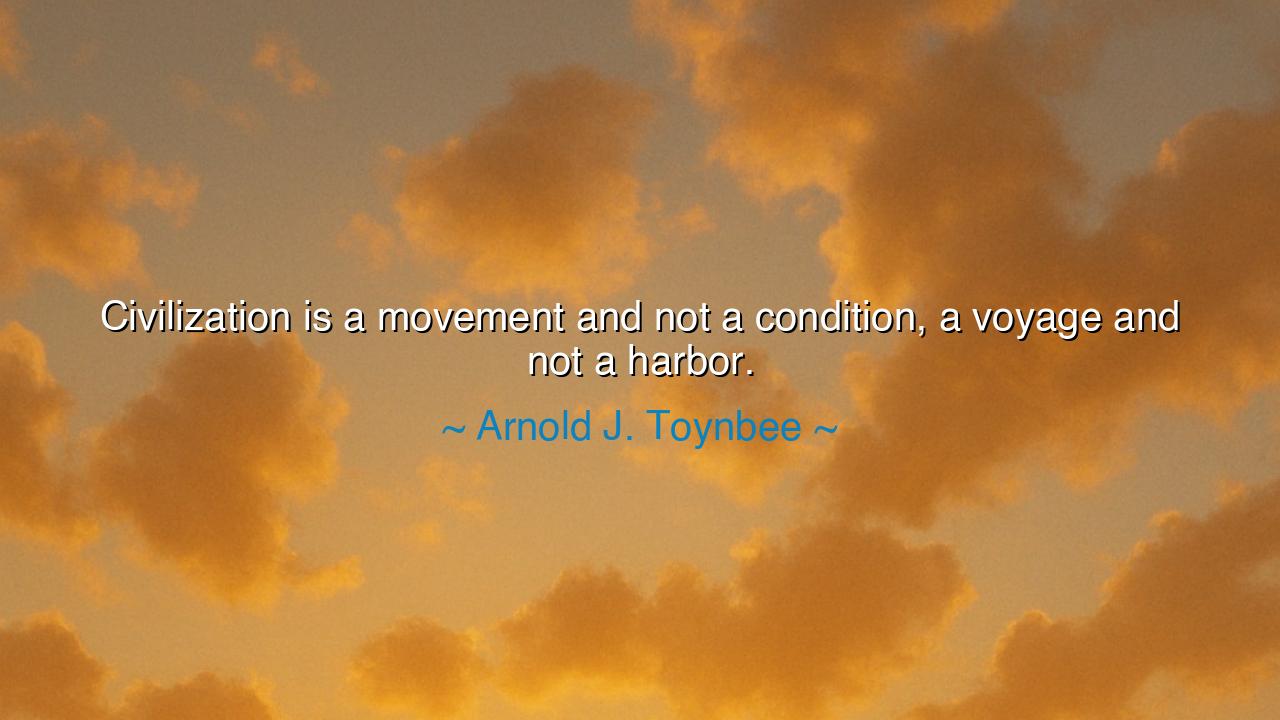
Civilization is a movement and not a condition, a voyage and not






The historian Arnold J. Toynbee, who gazed upon the rise and fall of civilizations with the eyes of both scholar and prophet, once declared: “Civilization is a movement and not a condition, a voyage and not a harbor.” In these words lies the essence of all human striving — that civilization is not a finished temple, but an eternal construction; not a stillness, but a journey. Toynbee, who studied the patterns of history across centuries and continents, saw that the strength of a people lies not in their comfort, but in their continual motion — their will to move forward, to grow, to seek beyond what is known.
When Toynbee spoke of civilization as a movement, he meant that it is alive — that it breathes and changes like the human spirit itself. The moment it ceases to move, it begins to die. Civilizations that believe they have reached perfection, that their greatness is complete, are already sinking into decay. For life itself is movement, and motion is the pulse of survival. The Greeks flourished not because they built perfect cities, but because they questioned, explored, and created. The Romans rose because they sought to build and organize, and they fell when they sought only to preserve and enjoy. Thus, the historian teaches us that to endure is not to rest, but to strive.
Toynbee’s insight was born from his great study of history, A Study of History, in which he traced the cycles of over twenty civilizations. He saw that each civilization begins as a response to challenge — to the harshness of the world, to the need to adapt, to survive. It is in facing difficulty that the human spirit ascends. But when challenge fades, when comfort reigns, the same spirit that once built monuments begins to weaken. Toynbee saw that every empire’s collapse began not with defeat from without, but with stagnation from within. Thus, civilization is not a state of achievement, but a voyage of continual renewal.
Consider the story of ancient Egypt. For centuries, its people built wonders that seemed eternal — pyramids that touched the heavens, temples that stood unshaken by time. Yet the very perfection of their art and order became their stillness. They ceased to question, ceased to innovate, ceased to move. Their civilization, once radiant with spiritual purpose, grew ceremonial and rigid, until it became a monument to its own past rather than a vision of its future. Toynbee’s words would echo across their silent stones: “Civilization is a voyage and not a harbor.” To stop moving is to begin to sink beneath the sands of time.
Yet the voyage is not one of conquest or expansion alone — it is a voyage of the human soul. Each generation must rediscover its direction, must reawaken its curiosity and courage. The harbor is always tempting: comfort, stability, peace. But these are illusions if they come without purpose. The true voyage of civilization is not toward luxury or power, but toward understanding — toward the mastery not of the world, but of the self. For only when mankind seeks inward wisdom as earnestly as outward progress can the voyage endure without self-destruction.
In this way, Toynbee’s words speak not only to nations, but to individuals. Every human life mirrors the arc of a civilization. When we stop seeking growth, when we think we have “arrived,” our spirit begins to fade. To live is to voyage — to pursue, to learn, to evolve. The wise do not anchor in their achievements; they set sail anew each morning, chasing the horizon of their potential. Movement is life, and every new challenge is the wind that carries us forward.
Therefore, my listener of the future, take this truth as your compass: do not seek the harbor too soon. Let your life, your work, your civilization remain a movement, ever-changing, ever-becoming. Build not a fortress against change, but a vessel to navigate it. When you feel weary of the voyage, remember that even the stars themselves are not fixed — they too are in motion, crossing the heavens through time. So long as you move, you live; so long as you seek, you rise.
Let Toynbee’s wisdom echo in your heart: “Civilization is a movement and not a condition, a voyage and not a harbor.” For in the ceaseless voyage lies the destiny of humankind — to keep discovering, to keep creating, to keep becoming more than we were yesterday. The harbor may promise rest, but it is the sea — vast, uncertain, infinite — that shapes the soul of civilization and the spirit of man.






AAdministratorAdministrator
Welcome, honored guests. Please leave a comment, we will respond soon